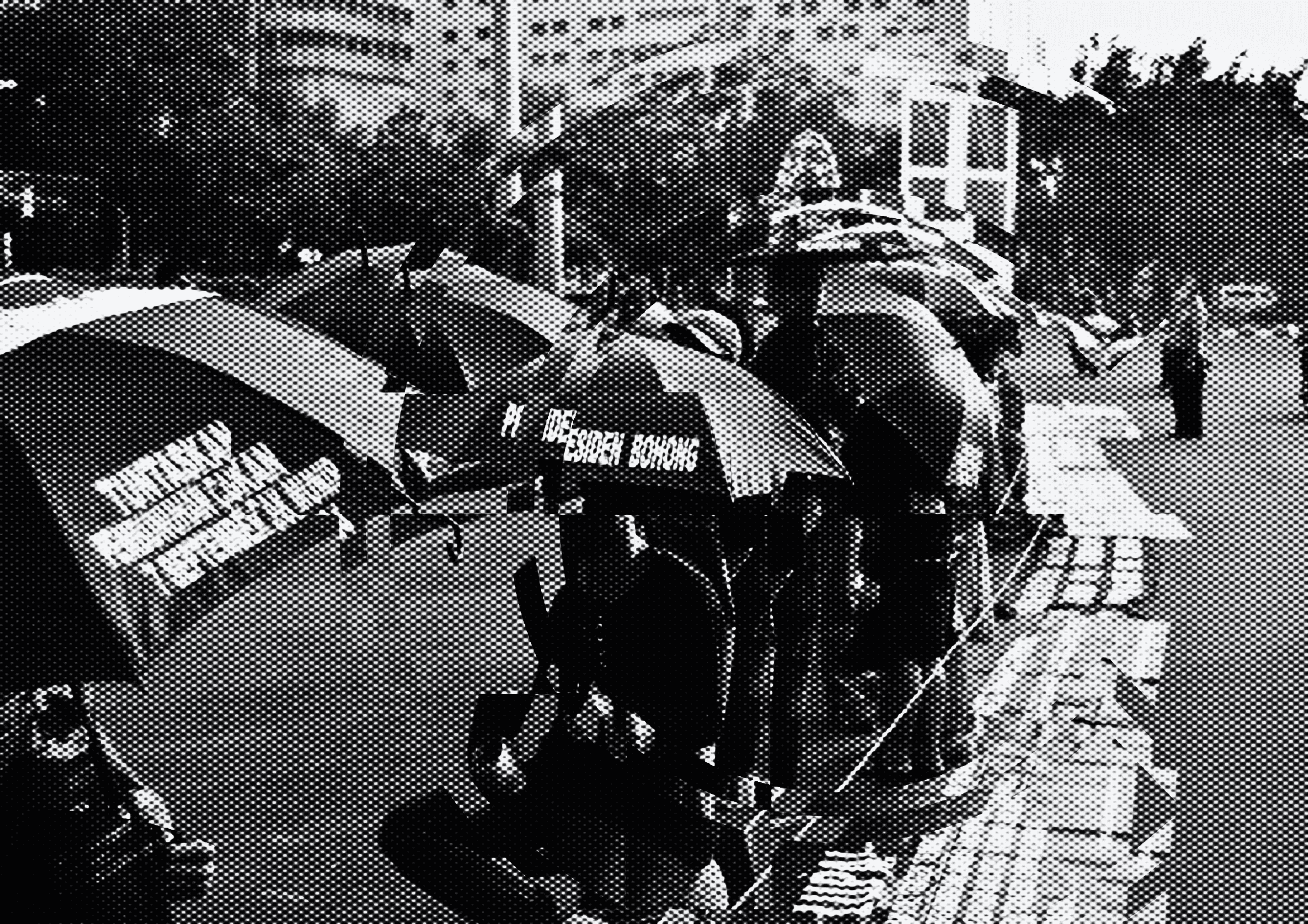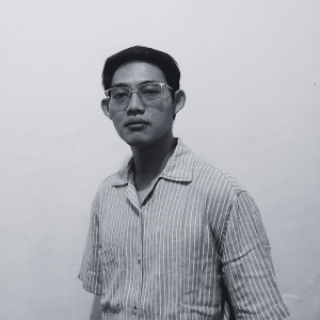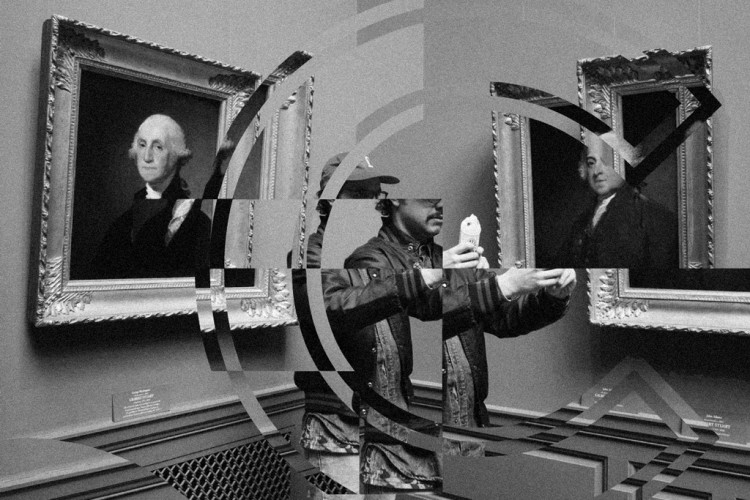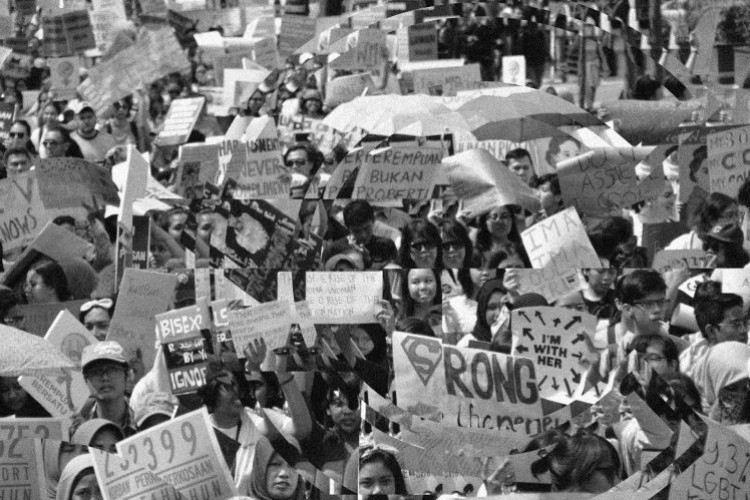
Why “September Hitam” Shouldn’t Stop at The Ninth Month
In this Open Column submission, Benny Agung made a point on how “prolonging the life” of September Hitam is worth everyone’s while: from having our voices heard, to achieving true reconciliation from the state.
Words by Whiteboard Journal
Only by seeing today as the past, can we talk about the future.
These words, spoken by a friend years ago, suddenly came back to me a few days ago during the Jakarta “September Hitam” commemoration on the 28th of September. Various groups and individuals were involved: collectives, students, workers, evicted residents, etc. Participating in this event made me recall these words that had become somewhat faint in my memory.
September Hitam is a term used to refer to various human rights violations that have occurred in Indonesia, including the 1965–1966 anti-communist purge, the murder of Munir, the Tanjung Priok tragedy, Semanggi II, the murder of Reverend Yeremia, the murder of Salim Kancil, and the crackdown on the 2019 #ReformasiDikorupsi protests. The term gained popularity after the fall of the Soeharto regime, when the space for freedom to speak out about these human rights abuses became relatively open. Every September, various groups continue to commemorate these events in different parts of Indonesia, although serious government efforts to resolve these cases and bring them to closure have been inconsistent.
Public Space as a Tool for Social Change
Like many other regions in Indonesia, Jakarta commemorates September Hitam. In this event, Jakarta’s communities have chosen to express themselves through street gigs, art exhibitions, and streetwear fashion shows. These activities take place in public spaces as an effort to utilize these spaces for the benefit of the public, that is, to interact with people outside of the collective, NGO, and activist circles; to freely express themselves; to enjoy art; and as a means of political education. This is because many public spaces in Jakarta have been excessively commercialized, losing their accessibility to the public, serving private business interests instead.
Engaging with individuals outside of established human rights networks is a critical objective. Public spaces are not merely symbolic sites of resistance against capitalist commodification but also serve as practical platforms for reaching a broader audience, particularly those often categorized as the floating masses in social science literature. By adopting youth-oriented cultural expressions such as art performances, these spaces can facilitate more organic interactions, complementing traditional methods of engagement like discussions and mass actions.
In practice, however, government authorities often respond to such occupations with suppression. As we experienced on the 28th, when we were forcibly evicted and intimidated by three platoons of police from our starting point at Sudirman, Dukuh Atas, it is evident that these spaces are not immune to state intervention. Nonetheless, the creation and expansion of such interactive spaces must persist as a crucial strategy.
Evolving Beyond Moralistic Movements
The accumulation of anger, often expressed through verbal abuse such as “fuck the police!” and “pemerintah kontol!” is a natural and understandable response to oppression. These expressions are not merely outbursts but rather justified reactions to the systemic corruption and brutality of the regime. However, while these expressions are valid, they are insufficient and represent a form of moralism that fails to address the root causes of injustice. As we know, perpetrators of human rights abuses during the September Hitam events remain unpunished and even occupy positions of power. They continue to live carefree lives, their hands stained with the blood of innocent victims. This is because they operate outside the realm of morality, recognizing no distinction between right and wrong. Consequently, moralistic responses are ineffective against such individuals. The victims, on the other hand, are real people with families and loved ones who have endured years of suffering, injustice, and powerlessness.
Paying lip service to the victims of human rights abuses by simply condemning the perpetrators as immoral is a gross insult to their memory. These victims were not merely casualties of a crime; they were targeted for their beliefs and actions. To honor them, we must go beyond moral condemnation and take concrete steps to address the root causes of the violence. This includes repealing repressive laws like TAP MPRS 1966, reforming the military and police, and trying to fulfill the demands of the #ReformasiDikorupsi movement. September Hitam should not be a time for passive remembrance but a catalyst for ongoing struggle. We must strive to prevail, for we are not condemned to the Sisyphean task.
Remembering September Hitam is not about reopening old wounds or inciting violence; it is about shaping our future. How can we achieve a prosperous and just Indonesia if we continue to ignore the atrocities of the past? A true reconciliation requires accountability for the perpetrators and a genuine apology from the state. While striving to realize this goal, our anger will never fade for those who have their hands stained with blood. As Martin Suryajaya said, “so let this old anger be our common prayer,” from his “Yang Lenyap dalam Senyap” (2014) writing:
“Maafkan aku, O bumi yang memerah darah,
karena aku lembek dan sopan dengan para jagal ini!
Engkau lah puing-puing manusia paling suci
Yang pernah hidup pada gelombang sejarah.
Remuklah tangan yang menumpahkan darah ini!
Di atas lukamu aku bersumpah
[…]
Kutuk akan jatuh ke lambung manusia
Amuk massa dan perang saudara yang buas
Akan tumpah di sekujur bumi;
Darah dan kehancuran akan begitu sehari-hari
Dan ngeri akan jadi karib
Sehingga ibu-ibu akan tersenyum ketika memeluk
Bayinya tercabik-cabik oleh perang;
Rasa kasihan akan mampus oleh kedurjanaan harian:
Dan hantu-hantu komunis, memekikkan kesumat,
Dengan Maut di sisinya, mendidih dari neraka,
Akan turun ke bumi dengan suara raja
Berteriak ‘Petaka,’ dan melepaskan amuk perang;
Sampai perbuatan busuk itu tercium di seluruh bumi
Dan mayat-mayat merintih minta dikuburkan.”
– Julius Caesar, Act III, Scene I












